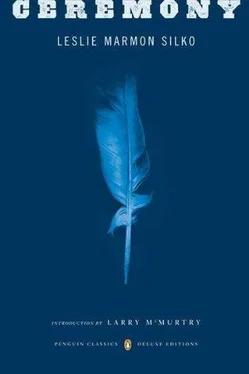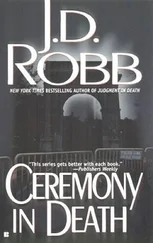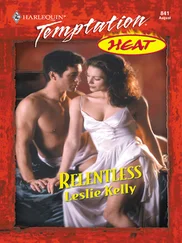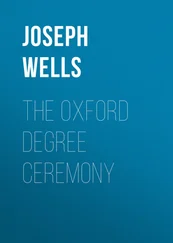A strange paralysis accompanied his thoughts; a sudden overwhelming fatigue took hold, and his heart pounded furiously, and he panted trying to walk only a few feet from the place he had tied the mare. His knees buckled, and he fell into the old pine needles and cones under a tree. This was the end. He wouldn’t even be able to try to escape; they would find him collapsed under the tree.
His face was in the pine needles where he could smell all the tree, from roots deep in the damp earth to the moonlight blue branches, the highest tips swaying in the wind. The odors wrapped around him in a thin clear layer that sucked away the substance of his muscle and bone; his body became insubstantial, so that even if the fence riders came looking for him with their.30-30s loaded and cocked, they would see him only as a shadow under the tree.
The mountain lion came out from a grove of oak trees in the middle of the clearing. He did not walk or leap or run; his motions were like the shimmering of tall grass in the wind. He came across the meadow, moving into the wind. Tayo watched it with his head against the ground, conscious of pine needles tangled in his hair. He waited for the mare to shy away from the yellow form that moved toward them; but the horse was upwind and did not stir. The eyes caught twin reflections of the moon; the glittering yellow light penetrated his chest and he inhaled suddenly. Relentless motion was the lion’s greatest beauty, moving like mountain clouds with the wind, changing substance and color in rhythm with the contours of the mountain peaks: dark as lava rock, and suddenly as bright as a field of snow. When the mountain lion stopped in front of him, it was not hesitation, but a chance for the moonlight to catch up with him. Tayo got to his knees slowly and held out his hand.
“Mountain lion,” he whispered, “mountain lion, becoming what you are with each breath, your substance changing with the earth and the sky.” The mountain lion blinked his eyes; there was no fear. He gazed at him for another instant and then sniffed the southeast wind before he crossed the stream and disappeared into the trees, his outline lingering like yellow smoke, then suddenly gone.
The horse was stamping her front feet and blowing her nostrils open wide to catch the mountain-lion smell that was on the wind now. Tayo stroked her neck and made sure the rope was tied securely to the tree. He went into the clearing where the mountain lion had stood; he knelt and touched the footprints, tracing his finger around the delicate edges of dust the paw prints had made, deep round imprints, each toe a distinctive swirl. He kept his back to the wind and poured yellow pollen from Josiah’s tobacco sack into the cup of his hand. He leaned close to the earth and sprinkled pinches of yellow pollen into the four footprints. Mountain lion, the hunter. Mountain lion, the hunter’s helper.
He rode the mare west again, in the direction the mountain lion had come from. The sound of the wind in the pine branches and the smell of snow from the mountain made him alert.
At dawn he stopped on a grassy ridge to watch the sun rise; he let the mare graze, part of the cycle of restoration. Inside him the muddy water turmoil was settling to the bottom, and streaks of clarity were slowly emerging. Gathering the spotted cattle was only one color of sand falling from the fingertips; the design was still growing, but already long ago it had encircled him.
When he turned away from the sun to mount the mare, he saw the spotted cattle, grazing in a dry lake flat below the ridge. They were facing southeast, grazing in a herd. They had smelled the horse and rider and were looking up at the ridge; his motion sent them running, with grass still hanging from wet lips. They ran as Robert said they did, wilder than antelope, smarter than elk about human beings. Their memory of people endured long after all other traces of domestication were gone; and he was counting on another instinct: the dim memory of direction which lured them always south, to the Mexican desert where they were born.
They ran southeast, in the direction he wanted them to go, with tails straight out behind their manure-stained haunches, running more like deer than cattle, moving from thicket to thicket for cover, avoiding the clearings. They favored trails too low and brushy for horses and riders. He let the mare run far behind them, confident of their direction. The cold air whipped tears in his eyes, but he felt good; they were gathered before him, headed for home. They took the trail they had worn along the fence and followed it east; he watched to be sure none of them circled back, but the old direction was persistent even in the half-grown calves. He slowed the mare to a lope and let the cattle go. The horse was tiring; she had frothy sweat on her shoulders and neck. If he followed the cattle too closely or pushed them too fast, they might break and scatter; they might miss the opening in the fence. He watched them appear briefly, crossing a ridge about a half mile ahead; they had already slowed from a dead run to a trot.
The sky was washed pale blue by the glare of the sun; there were no clouds, but he could feel a strong wind from the west at his back, and he knew there would be storm clouds before noon. In the distance up ahead he occasionally caught glimpses of the cattle, trotting steadily; they appeared in clearings and disappeared into oak thickets again, still following the south boundary fence to the east.
The tension in the muscles of his neck and shoulders unwound with each breath he took. He smiled and patted the mare on the neck; the hair was still damp and stiff with sweat. He slowed her to a walk, confident that the cattle would veer through the break in the fence and continue south down the trail off the mountain plateau. He kicked his boots loose from the stirrups and stretched his legs; the tendons and muscles unlocked from the flexed position of the saddle. He had proved something to himself; it wasn’t as strong as it had once been. It was changing, unraveling like the yarn of a dark heavy blanket wrapped around a corpse, the dusty rotted strands of darkness unwinding, giving way to the air; its smothering pressure was lifting from the bones of his skull.
From the corner of his eye he saw them, at first mistaking them for a strand of his own hair caught by the wind. But when he turned there were two riders approaching from the north. He whipped the mare into a dead run, crouching low over her neck, trying to guide her over the rocky, uneven terrain, down the steep slope of a ridge. They were about a mile away when he first saw them, so he would try to find a deep grove of pine where he could stay until they passed. He strained to see if the cattle were still in sight, wondering if the riders had seen them. The bill of sale in his shirt pocket would mean very little to armed patrolmen chasing a trespasser. He pressed his heels into the mare’s sides to make her run faster, but the lava rock was already scattering from under her feet, and she was fighting to keep her balance. He looked over to see if they were on the hilltop behind him yet; they weren’t, so he reined the mare in, to save some of her strength. He wiped the tears that the wind whipped in his eyes onto the sleeve of his jacket and tried to focus on the ridges and flats ahead, searching for the lava-rock knob and the lightning-struck pine that marked the hole in the fence.
He opened his eyes to a bright blue sky and clouds that were full, but very high: and for an instant he was waking up years before, on a nameless island in the Pacific. He thought he had been hit, and he began to call for Rocky to help. Then he saw the color of his sleeve of his shirt, and felt the dry lava pebbles pressing into his raw hands.
He could remember seeing the sunny bright day and the faint autumn colors emerging in the scrub oak; he remembered thinking how funny it was to be in such trouble in the middle of the day, when it was nighttime and darkness that were suspected occasions of danger. He remembered seeing the skeleton pine tree in the distance, above a bowl-shaped dry lake bed, and the last cow bolting through the opening in the wire, kicking her heels at the wire as she plunged through, disappearing over the horizon. He remembered all this clearly, even the way the mare fell, her front legs sliding in the rocks, and the slow shivering roll of her body as she fell.
Читать дальше












